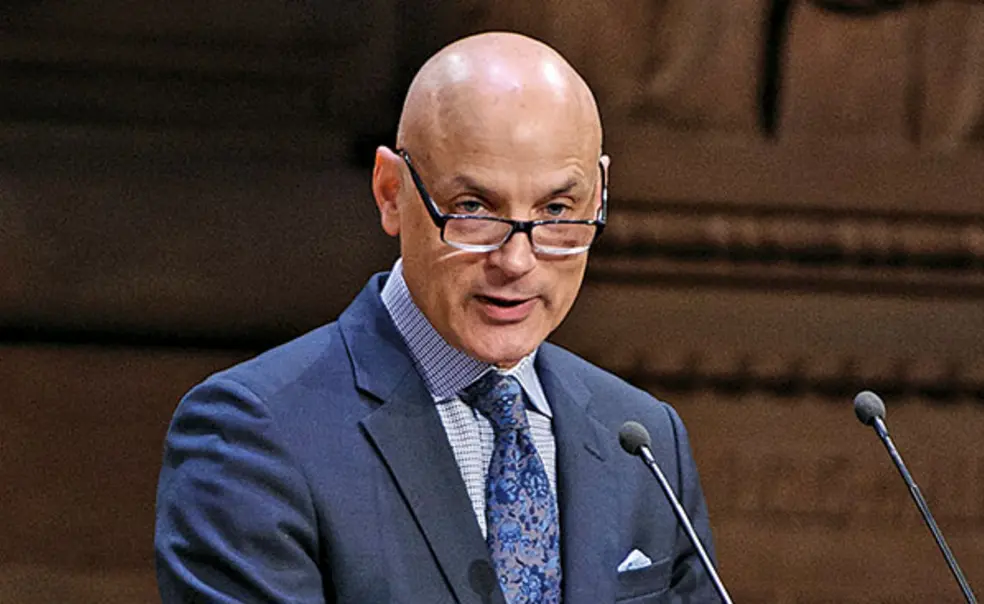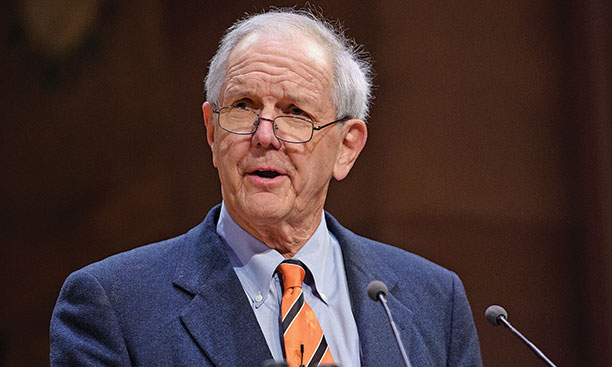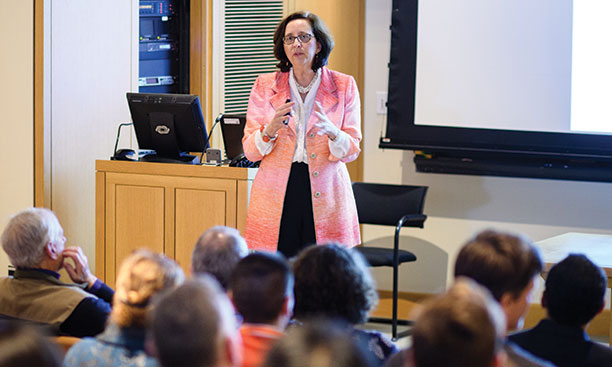Alumni Day: Speakers Call for Civility, Free Speech
Alumni Day medalists weigh in on troubling trends
In his lecture on Alumni Day, author and critic Daniel Mendelsohn *94, winner of the James Madison Medal, began with a scene from his ride on the train from New York to Princeton. On his journey, he overheard two cellphone conversations: Tiffany was breaking up with Travis — “spitting and hissing into her Samsung Galaxy” — and Mr. Lundquist was firing Denise “or, possibly, Elise: The speaker on the LG smartphone wasn’t all that clear.” For the Bard College classics professor, all of this, naturally, led him to ponder Latin etymology, particularly the word civis, the root word of civilization.
“‘Civility’ is the behavior that marks mutual acknowledgment that we individuals share common public, and political, space,” he said. “Think about the platforms through which you interact with people all day, the media that we call ‘social’ but that, if anything, have enhanced our ability to be asocial: to screen out every element of society, and culture and politics, that doesn’t suit or flatter or soothe us, thereby removing the necessity for ‘civility’ in the first place.”
Throughout his lecture, Mendelsohn called upon the notions of public life held by Madison and his fellow founders and the civic sensibilities of the ancient Greeks and Romans. Through these various snapshots of civic and social engagement throughout time, Mendelsohn argued that a modern decline in civility and empathy, promoted by a lack of face- to-face interactions online, has broad political implications.
“The polarization of politics over the past two decades stems directly, it seems to me, from [an] increasingly hermetic view of the world,” he said. “If you’re rarely exposed to other kinds of people and alternative views, they will become first unimaginable and then intolerable. And from the rhetoric of intolerance, it’s only a short step to the politics of intolerance.”
In a question-and-answer session, Mendelsohn explained that he tells students on the first day of class that laptops and cellphones are prohibited — his attempt to reaffirm for students the need for humans to communicate in person and not through screens.
Woodrow Wilson Award winner Charlie Gibson ’65, the retired ABC news anchor and Good Morning America host, looked back on his career and the many major events of American history he reported on, from the 1995 Oklahoma City bombing to the 2008 election of President Barack Obama. In his first on-air job in 1967, for a local Lynchburg, Va., news program, he worked to cover the black community there, which had been ignored by the local paper. In addition to being excoriated in the newspaper’s editorials for his work, on his final day at the job all four of his car’s tires were slashed.
“It was in Lynchburg that the thought first occurred to me that my college’s informal motto — ‘in the nation’s service’ — might apply to me,” he said. “It was naïve perhaps not to realize that journalism, when done right, provides a real service, but ... no thoughts so noble as being in the nation’s service had occurred.”
Gibson critiqued today’s polarized political climate, specifically what he considers a threat to the First Amendment posed by constant claims of fake news, especially by President Donald Trump.
“It is not lost on me that the Wilson Award selection committee has this year chosen a journalist — at a time when the profession is under attack to a degree that I never contemplated possible,” he said.
“You can debate policy, and you have to give the president his due — 63 million Americans did, and that choice has to be respected. But since then the president has attacked many of America’s most fundamental underpinnings, including truth and freedom of the press; the latter is guaranteed by the First Amendment — not the Eighth or the 15th or the 25th but the First,” he said. “That should alarm everyone — Trump detractors and supporters alike.”
He explained that by calling to “open up” libel laws and criticizing the press, the president has emboldened foreign dictators to limit speech abroad. Gibson called 2017 “one of the most dangerous years to be a journalist. At least 262 journalists around the world were imprisoned for their work — that’s a new high.”
Among the variety of other events during the day, alumni could hear from Dean of Admission Janet Rapelye about navigating the admissions process (“It’s staggeringly competitive”) and from Elizabeth Colagiuri *99, deputy dean of the college, on student-life issues (a calendar change that would move fall-term exams before the winter holidays may be acted on this year). The 1,000 attendees also had a chance during lunch to hear from this year’s Pyne Prize winners and Jacobus Fellowship recipients (see story at left) and to honor Princetonians who died during the past year at the Service of Remembrance in the University Chapel.














2 Responses
Charles Frisbie ’61
7 Years AgoThreatening Press Freedom
According to PAW, on Alumni Day Charlie Gibson ’65 apparently attacked President Trump for Trump’s tweets criticizing some in the press as being inaccurate (Princetonians, March 21). Not mentioned in the article — and presumably not mentioned by Mr. Gibson — was the Obama administration’s action in labeling James Rosen of Fox News as a “criminal co-conspirator” in a 2013 investigation into documents leaked to the media. That omission amounts to bad reporting and possibly to fake news. It is abundantly clear that this was a far greater threat to freedom of the press than verbal debating, even if rude.
Over the years, conservatives have rightly complained about the left-wing slant of much of the news. I regret to say that I detect some of this in PAW.
Jonathan C. McCall ’72
7 Years AgoGreek, Not Latin
Re “Speakers Call for Civility, Free Speech” (Princetonians, March 21): I believe that your reporter misunderstood David Mendelsohn *94. “Idiōtēs” is an ancient Greek word, not a Latin word.